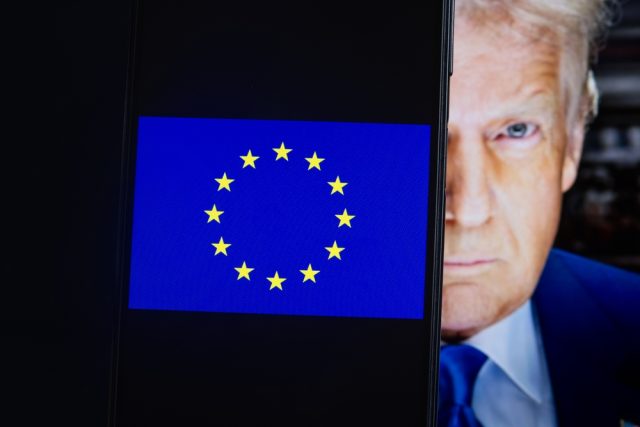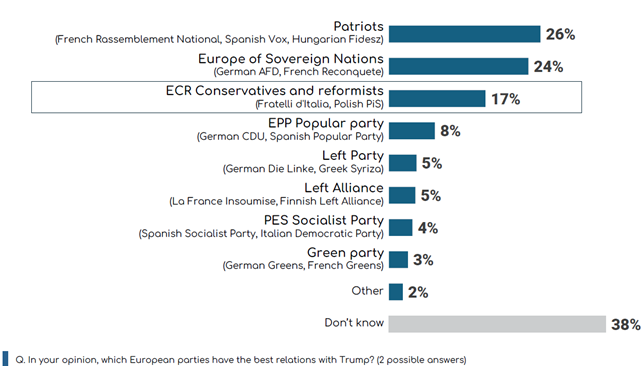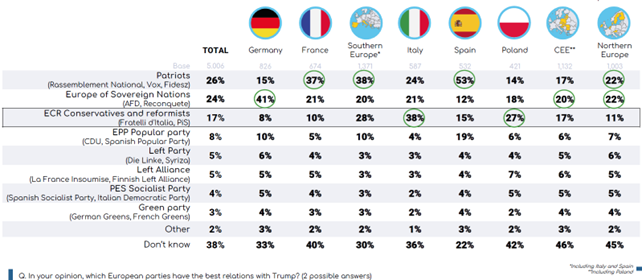
The Polling Europe agency conducted a survey for ECR between 14 and 24 March 2025 on the perception of European parties’ relations with Donald Trump. A very interesting topic, especially in light of the international situation created by the indication (and then temporary suspension) of trade tariffs by the US President.
THE SURVEY
The poll was conducted online on a representative sample (5,006 interviews) of citizens over the age of 18 of the Union divided into five areas of analysis: Germany, France, Central and Eastern Europe (Baltic States, Poland, Czech Republic, Slovakia, Hungary, Romania, Bulgaria, Croatia, Slovenia), Northern Europe (Sweden, Denmark, Finland, Belgium, Netherlands, Luxembourg, Ireland, Austria) and Southern Europe (Spain, Italy, Portugal, Greece, Malta, Cyprus). Separate data were collected – but still contained within the area of belonging – for three countries: Italy, Spain and Poland. It should also be stressed that the questions concerning European political families do not imply such a precise knowledge of European politics and institutions on the part of the respondents. In fact, the poll used the indication of voting towards national political forces in order to reorient the position at the European level.
HIGHER PERCENTAGES TO THE RIGHT
Starting with the first question of the poll, it is easy to give an initial description of the respondents’ answers. It is immediately obvious that, according to the answers given by the respondents, it is the right-wing parties that are more closely linked to Trump, having better relations with him. In first position with 26% of the indications (each respondent could give two different options) are the Patriots, containing within them – just to name a few – parties like the French Rassemblement National or the Spanish Vox. At 24% there are the sovereignists, like AFD in Germany or Reconquete in France. The ECR conservatives come in third in this ranking at 17%. Parties such as Fratelli d’Italia are thus seen as among those most likely to engage with the tycoon, even if President Trump’s identification with more extreme positions tips the scales more towards far-right parties. The arrangement of the data is clear, with the lowest peak occupied by the Greens. Indeed, it is difficult for these political parties to find a point of contact with Trump’s policies, especially from the point of view of combating climate change.

ITALY, POLAND AND ECR
Looking more in detail at the geographical distribution of these data, we see how the figure that delivered the highest percentage of European Patriots is mainly trailed by the countries of Southern Europe (38%), by respondents in France (37%) and especially in Spain (53%). In Italy, the highest figure is won by ECR (38%), a result certainly brought about by the question on voting intention, in this case linked to Fratelli d’Italia. The general feeling of the interviewees is, therefore, that for themes and positions it would be easier for populist and extreme right-wing parties to talk to Donald Trump. What makes a difference for Italy is certainly the personal relationship built by leader Meloni (of Fratelli d’Italia and ECR) with the US President. The only European leader present on inauguration day with a large ECR delegation, Meloni has certainly built a relationship with the tycoon that, at home, is recognised and identified as an excellent means of weaving important relations between the two sides of the Atlantic. Another driving force is Poland. In this case, the link is with Mateusz Morawiecki, the new leader of ECR from 2025 (after the handover with President Meloni) and former head of the Polish government.

THE LIMIT OF AWARENESS
In conclusion, there is an alarming figure related to those among the respondents who could not give an answer. These are very high percentages, which in the case of Eastern Europe reach 46% of the respondents. A figure that demonstrates once again how distant European and international politics is from the daily lives of the citizens of individual member states, who are more attentive to domestic politics and national vicissitudes than to European issues or relations in the international arena.



 Subscribe
Subscribe